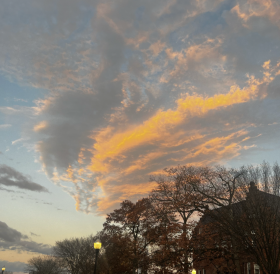
Collaboration within the Film Department
Throughout my time at Dartmouth, I've received a lot of questions from prospective Dartmouth applicants interested in film who've been trying to decide whether the college is the place for them. They're usually unfamiliar with Dartmouth's film program or whether there's a culture of art here. I've often answered those questions by saying variations of the same thing—"small but tightly knit." It's a great thought, and it's prompted a lot of prospective film majors to end up applying. The film program now is decidedly more extensive than it was when I was a first-year, and I see significantly more students excited for film classes.
The department itself seems to be growing—there are new classes all the time, touching upon diverse aspects of the field: production, Western theory, non-Western theory, etc.
This week, though, I really saw the air of collaboration while working on four different student short films (mine included!). I'm currently in a class called Filmmaking 1 (FILM31), and it's a great mix of film majors and non-majors who are just interested in making their own movies. We've been learning how to handle camera equipment, how to properly light subjects, how to use audio, and how to direct actors effectively. The scope has been wide and rapid—over just eight weeks, we've covered various responsibilities in the filmmaking process.
Still, this week, I helped make four very different realities come to life. The first, and in my opinion the most fun, was a film about food and how it acts as a love language for certain people. We spent hours shooting a B-roll of a sizzling chicken stew, trying to figure out ways to make audiences salivate for the food despite the fact that they couldn't taste or smell it. We were a crew of four people who worked really hard, and I'm super proud of the end result!
Later that week, we collaborated on another peer's horror film. It had a completely different vibe, though it was equally interesting. It was fascinating to see how genre changes can really affect the technical aspect of filmmaking. For the class, specifically, we rounded out the week with another student's short film, this time entirely set in a grocery store. We used Collis Market, Dartmouth's on-campus grocery store, to film. Throughout, the collaborative spirit remained really strong.
A question that a lot of potential students have is about the availability of a diverse demographic of actors, given that Dartmouth is somewhat rural. Truthfully, it's never been a problem because, like on this set, the filmmaker collaborated with the Film Department to find elderly and young actors from the Upper Valley theater scene, which is super strong.
Finally, I worked on my friend's senior thesis project, which is still in the scripting stage. This was the most fun one because when you're writing, you're not constrained by technicalities! Still, I look back at this week and think it exemplified the generic answer I've been giving all these years. Yes, the film department is small but tightly knit, and yes, that's probably the best thing about film at Dartmouth.















